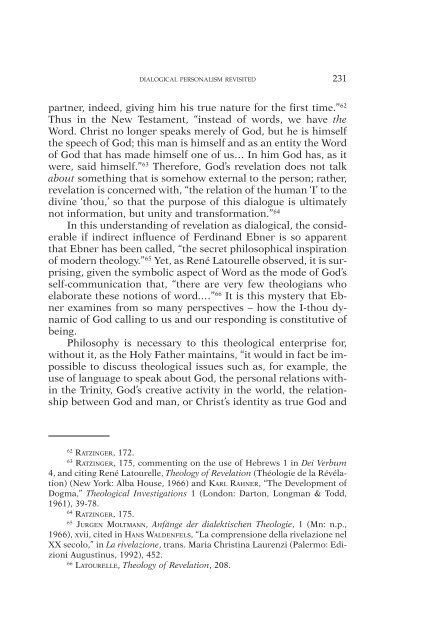Avant-propos - Studia Moralia
Avant-propos - Studia Moralia
Avant-propos - Studia Moralia
Create successful ePaper yourself
Turn your PDF publications into a flip-book with our unique Google optimized e-Paper software.
DIALOGICAL PERSONALISM REVISITED 231<br />
partner, indeed, giving him his true nature for the first time.” 62<br />
Thus in the New Testament, “instead of words, we have the<br />
Word. Christ no longer speaks merely of God, but he is himself<br />
the speech of God; this man is himself and as an entity the Word<br />
of God that has made himself one of us… In him God has, as it<br />
were, said himself.” 63 Therefore, God’s revelation does not talk<br />
about something that is somehow external to the person; rather,<br />
revelation is concerned with, “the relation of the human ‘I’ to the<br />
divine ‘thou,’ so that the purpose of this dialogue is ultimately<br />
not information, but unity and transformation.” 64<br />
In this understanding of revelation as dialogical, the considerable<br />
if indirect influence of Ferdinand Ebner is so apparent<br />
that Ebner has been called, “the secret philosophical inspiration<br />
of modern theology.” 65 Yet, as René Latourelle observed, it is surprising,<br />
given the symbolic aspect of Word as the mode of God’s<br />
self-communication that, “there are very few theologians who<br />
elaborate these notions of word.…” 66 It is this mystery that Ebner<br />
examines from so many perspectives – how the I-thou dynamic<br />
of God calling to us and our responding is constitutive of<br />
being.<br />
Philosophy is necessary to this theological enterprise for,<br />
without it, as the Holy Father maintains, “it would in fact be impossible<br />
to discuss theological issues such as, for example, the<br />
use of language to speak about God, the personal relations within<br />
the Trinity, God’s creative activity in the world, the relationship<br />
between God and man, or Christ’s identity as true God and<br />
62 RATZINGER, 172.<br />
63 RATZINGER, 175, commenting on the use of Hebrews 1 in Dei Verbum<br />
4, and citing René Latourelle, Theology of Revelation (Théologie de la Révélation)<br />
(New York: Alba House, 1966) and KARL RAHNER, “The Development of<br />
Dogma,” Theological Investigations 1 (London: Darton, Longman & Todd,<br />
1961), 39-78.<br />
64 RATZINGER, 175.<br />
65 JURGEN MOLTMANN, Anfänge der dialektischen Theologie, 1 (Mn: n.p.,<br />
1966), xvii, cited in HANS WALDENFELS, “La comprensione della rivelazione nel<br />
XX secolo,” in La rivelazione, trans. Maria Christina Laurenzi (Palermo: Edizioni<br />
Augustinus, 1992), 452.<br />
66 LATOURELLE, Theology of Revelation, 208.

















